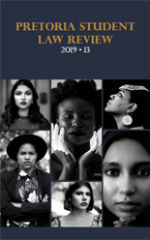Pretoria Student Law Review 2019-13

Pretoria Student Law Review 2019-13
Editor in chief: Primrose Egnetor Ruvarashe Kurasha
Editors: Thato Petrus Maruapula, Mzwandile Ngidi & Frieda Shifotoka
2019
ISSN: 1998-0280
Pages: 243
Print version: Available
Electronic version: Free PDF available
| File Size: | 2.75 MB |
| File Type: | application/pdf |
| Hits: | 8657 Hits |